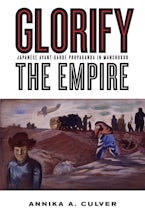Introduction: Propaganda in the Manchukuo Context, 1932-45
1 Laying the Groundwork for the Japanese Avant-Garde Propagandists
2 Literature in Service of the State: Yamada Seizaburô and Right-Wing Proletarianism, 1931-43
3 Surrealism in Service of the State: Fukuzawa Ichirô and Associates, 1935-36
4 The Lure of Artistic Vision and Commercial Prerogative: Ai Mitsu and the Burden of Representation, 1935 and 1943
5 Reflections of Labour and the Construction of the New State: Fuchikami Hakuyô and Manchuria Graph, 1933-41
6 The Manchukuo Publicity and News Bureau's War of Words and Images: Mutô Tomio and the Discourse of Culture, 1938-43
7 The Legitimization of a Multi-Ethnic Literary Culture in Manchukuo: Kawabata Yasunari's Promotion of Manchurian Literature, 1941-44
Conclusion: The Reflected Utopia Darkens: Manchukuo, Imperial Japan's Surrender, and Postwar Issues
Notes
Bibliography
Index

